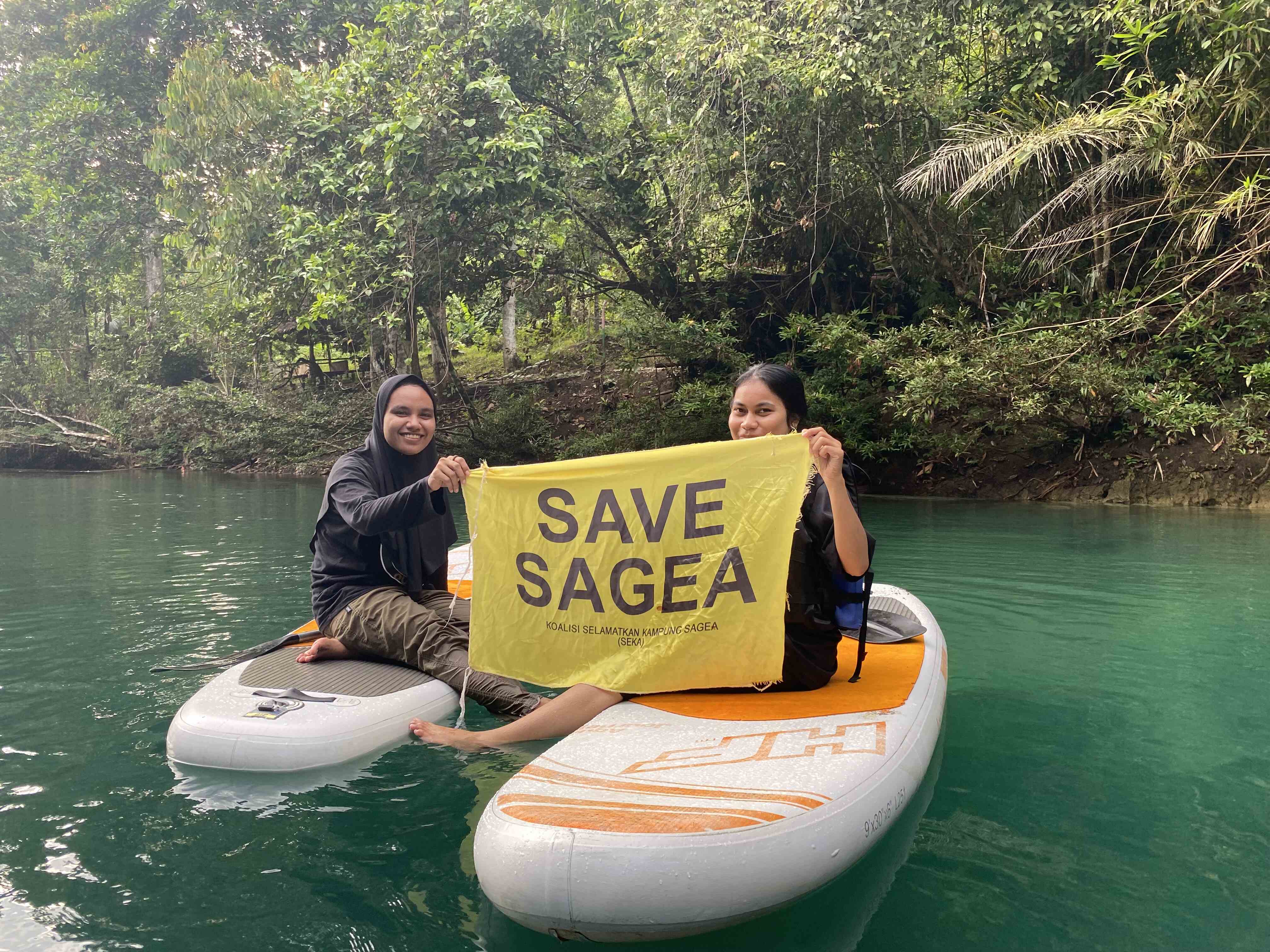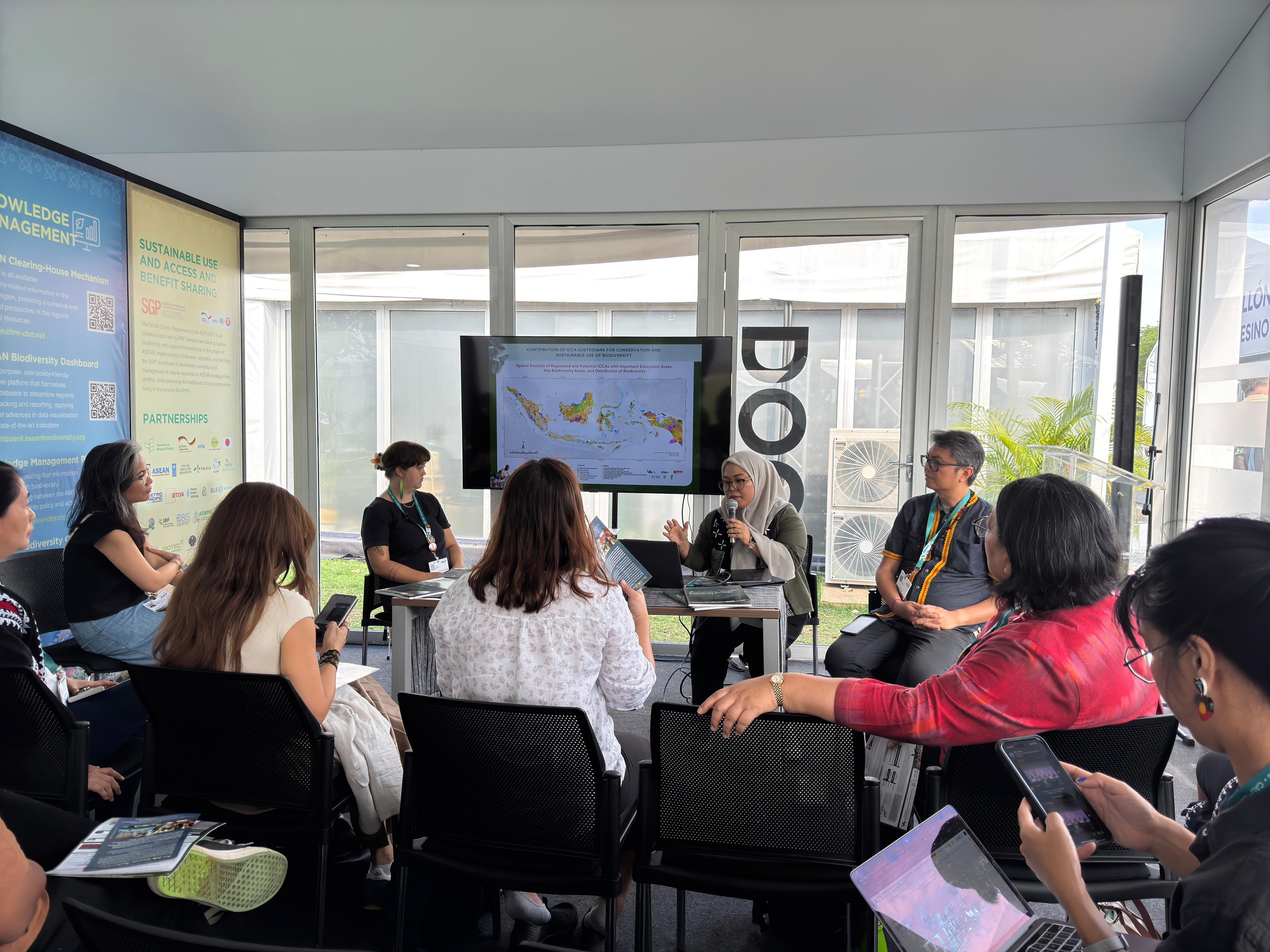Indonesian Civil Society Urges Government to Support Indigenous Peoples' Agenda at COP 16 CBD
Indonesian civil society organizations present in CBD Cali are calling on the negotiating governments and the global community to support the agenda concerning the rights of indigenous peoples and local communities.
Cali, Kolombia, 24/10/2024 – Nearly 200 countries are gathering in Cali, Colombia, to negotiate efforts to halt and reverse environmental damage and biodiversity loss. Indonesian civil society organizations present in Cali are calling on the negotiating governments and the global community to support the agenda concerning the rights of Indigenous Peoples and Local Communities (IP&LC).
The Urgency of Supporting the Indigenous Peoples' Agenda at COP 16
The recognition of the rights of Indigenous Peoples and Local Communities plays a crucial role in the Kunming-Montreal Global Biodiversity Framework (KM-GBF), agreed upon two years ago. At COP 16 CBD, Indigenous Peoples are urging attending countries to ensure full acknowledgment of their contributions to global biodiversity protection. They also advocate for the establishment of a permanent Subsidiary Body, binding under Article 8j, focused on local knowledge, innovations, and traditional practices in biodiversity conservation.
Unfortunately, Indonesia's delegation has opposed the establishment of this Subsidiary Body, despite the significant contribution Indigenous Peoples and Local Communities make toward achieving KM-GBF targets.
"The rejection of the Subsidiary Body under Article 8j on Knowledge, Innovation, and Traditional Practices by Indonesia is a step backward. Discussions to formalize the Working Group on Article 8j have been ongoing for 20 years to ensure the protection of traditional knowledge, as well as innovations and practices of Indigenous Peoples and Local Communities in utilizing and protecting genetic resources. After the KM-GBF commitment, a framework and the creation of the Subsidiary Body would ensure that justice and social dimensions of the KM-GBF's implementation are measured and guaranteed," said Cindy Julianty from WGII (Working Group on Indigenous and Local Communities-Conserved Areas and Territories Indonesia).
Currently, 30.1 million hectares of Indigenous territories in Indonesia have been mapped, but only 16% of these areas have been legally recognized. "Securing land rights for Indigenous Peoples is essential if we are to protect the remaining biodiversity," said Kasmita Widodo, Head of the Indigenous Territory Registration Agency (BRWA).

Masyarakat adat di Tapanuli menyadap kemenyan. Foto: Yudi Nofiandi/Auriga
Safeguarding Indigenous lands and conservation areas will help Indonesia achieve the 30x30 target (protecting 30% of biodiversity areas on land and sea by 2030). According to the latest WGII data, more than 22 million hectares are managed and protected using traditional knowledge, contributing to the conservation goals of the Global Biodiversity Framework.
Immediate Action Needed to Stop Biodiversity Loss
Indonesia's biodiversity is currently threatened by extractive industries such as mining, large-scale agriculture, and various national strategic projects. Extractive permits cover over 100 million hectares of land and sea in Indonesia (55.5 million hectares on land and 45.4 million hectares at sea). These industries, driven by global demand for coal, palm oil, timber, and nickel, have led to massive deforestation and habitat destruction.
In his October 20 inauguration speech, President Prabowo set a goal of food self-sufficiency within 4-5 years, relying on food estates. Food estate programs are currently being developed in
several provinces, including Central Kalimantan, North Sumatra, and South Papua, targeting over 2 million hectares. These programs have devastated biodiversity ecosystems, Indigenous lands, and traditional cultures.
Ogy Dwi Aulia from Forest Watch Indonesia emphasized that commitments to biodiversity protection must be shown through concrete actions, significantly reducing extractive activities that endanger biodiversity in Indonesia, such as nickel, palm oil, food estates, logging, and mining. "Currently, over 1 million hectares of extractive industries are operating within conservation areas. Additionally, 20.5 million hectares of extractive industries are located within key ecosystems such as wildlife corridors, biodiversity parks, and critical biodiversity areas," added Ogy.
Indonesia's marine biodiversity also requires immediate protection. Millions of hectares of Indonesia's marine areas are managed sustainably by coastal communities, contributing to food security and achieving the Indonesia Biodiversity Strategic Action Plan (IBSAP), particularly the effort to protect 30% of Indonesia's marine areas.
"In the Marine and Coastal Biodiversity agenda, as well as for small islands, Indonesia must support texts that ensure community participation in decision-making, access to justice and information, and protection for human rights and environmental defenders, Indigenous Peoples, and local communities, using a human rights-based approach," explained Rayhan Dudayev from Greenpeace.

At least 18 endangered species are in jeopardy by the nickel mining expansion. @Auriga Nusantara.
"Moreover, it would be strategic for Indonesia to support Annex 2(g) to enhance understanding of ocean acidification impacts and other pressures on island ecosystems, which is highly relevant for our country as one of the largest maritime nations in the world," he added.
Support Direct Funding for Indigenous Peoples and Local Communities
Indigenous Peoples are recognized as a global force in curbing climate change and preventing biodiversity loss. However, the current financial mechanisms are inadequate, leaving Indigenous Peoples without sufficient resources to protect biodiversity. Indonesian civil society organizations are calling for the establishment of direct funding mechanisms to support Indigenous Peoples, small-scale fishers, farmers, and local communities without relying on market-based solutions such as biodiversity credits and offsets.
"We need a transparent and accountable funding system, accessible directly to Indigenous Peoples, to continue our critical conservation work," said Eustobio Rero Renggi, spokesperson for the Indigenous Peoples Alliance of the Archipelago (AMAN), who also attended COP 16 CBD.
Unfortunately, the Indonesian government delegation at COP 16 CBD opposed the idea of direct funding for Indigenous Peoples and Local Communities. During the event, the Indonesian delegation voiced support for India's stance, which stated that "direct funding" for Indigenous Peoples was unnecessary. Additionally, the Indonesian delegation aligned with Brazil's position that such funding should be channeled through national authorities, thus aligning with national interests.
Eustobio expressed regret over the stance of the Indonesian government delegation and urged them to retract their statement. "On behalf of Indigenous Peoples, we regret the Indonesian government's delegation's position, which disregards our constitutional rights as the primary custodians of ecosystems and biodiversity, preserved for generations before the state's existence," said Eustobio. He further urged the Indonesian government to agree with the proposals from the majority of countries supporting direct funding.

Local community of Sagea Village, North Molucca, protecting local forest, biodiversity, and river-based ecotourism from mining expansion. Photo: Timer Manurung/Auriga Nusantara.
"Countries like Mexico, Namibia, Switzerland, and even the European Union have committed to supporting direct funding. Indonesia should follow the positive example of these countries, especially since 60% of the world's Indigenous population resides in Asia, with Indonesia being a key player," Eustobio concluded.
Contacts:
- Ogy Dwi Aulia, Forest Watch Indonesia (FWI), Email: ogy@fwi.or.id, Phone: +62 813-1498-9276
- Cindy Julianty, WGII (Working Group on Indigenous and Local Communities-Conserved Areas and Territories Indonesia), Email: cindy.julianty@gmail.com, Phone: +62 851-2110-
- Eustobio Rero Renggi, Indigenous Peoples Alliance of the Archipelago (AMAN), Email: eustobio@aman.or.id, Phone: +62 823-4229-5139
Attachments: Indonesian CSO joint statement to the COP16 Colombia
References:
- COP-16 is a critical moment that requires all parties to ensure that member states finalize their National Biodiversity Strategy and Action Plan (NBSAP), guiding the implementation of the Kunming-Montreal Global Biodiversity Framework. COP-16 CBD will also establish supporting documents to monitor KM-GBF commitments nationally, including negotiation items such as monitoring frameworks, Article 8j, resource mobilization, and capacity-building mechanisms.
- Article 8(j) states that each Party to the agreement, as far as possible and as appropriate, shall: In accordance with national legislation, respect, preserve, and maintain the knowledge, innovations, and practices of Indigenous and local communities embodying traditional lifestyles relevant for the conservation and sustainable use of biological diversity. Additionally, Parties should promote the wider application of such knowledge, innovations, and practices with the approval and involvement of the holders of such knowledge, innovations, and practices, as well as encourage the equitable sharing of benefits arising from their utilization.
- Indonesia is one of the countries with unparalleled biodiversity, covering 190 million hectares of land and 327 million hectares of marine area. This biodiversity is spread across more than 17,000 islands surrounded by seas. Indonesian Civil Society Organizations (CSOs) are urging negotiators to address three key issues that are crucial to securing the future of biodiversity and the Indigenous and local communities that are part of it.
- As part of their commitment to biodiversity and the rights of Indigenous Peoples and Local Communities, Indonesian Civil Society Organizations have issued a joint statement in response to the ongoing negotiations at COP 16 CBD in Cali, Colombia, from October 21 to November 1, 2023. Here is the link to the joint statement of Indonesian CSOs: Joint Statement of Indonesian Civil Society Organizations to COP 16 CBD

